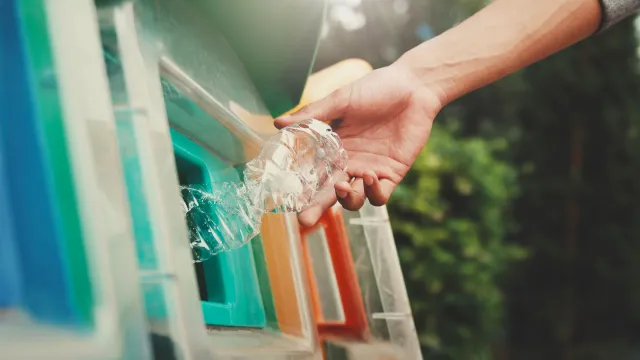Recycled plastic
How we ensure compliance with new European regulations
Lifeanalytics Product Safety, our Business Unit dedicated to packaging safety, also focuses on the safety of packaging made from recycled plastics, with the goal of ensuring safe, high-quality products for both our clients and end consumers.
The safety of these materials must be carefully assessed, as the chemical substances they contain can migrate into food. As a result, companies are required to follow good manufacturing practices to ensure that any potential transfer of substances to food does not pose a risk. Compliance with these practices involves adhering not only to national laws but also to regulations issued by the European Union.
Regarding recycled plastic, the recent Regulation (EU) 2022/1616 on recycled plastic materials and articles intended to come into contact with food, which came into effect on October 10, 2022, requires that the production chain adapt to meet new requirements.
In addition to the new regulation, recycled plastic must also comply with Regulation 10/2011 and its subsequent updates regarding plastic food contact materials. Therefore, recycled plastics used in these products must meet the same safety standards as those made from virgin plastic. The regulation sets rules for the manufacturing process and the recycled content to ensure that the decontamination process results in safe plastic. The European Food Safety Authority (EFSA) must assess the recycling processes to ensure they are capable of producing safe plastic materials and that the processes can be authorized.
To support companies in meeting these requirements, Lifeanalytics offers a complete range of testing and consulting services, including EFSA notification, supplier assessment and GMP in the supply chain, preliminary verification and audit of recycling processes, testing according to Regulation 10/2011 and Regulation 2022/1616, and the performance of challenge tests.
Plastic recycling: our full range of services
EFSA notification
Notification to EFSA (European Food Safety Authority) is a key step in placing recycled plastic materials and articles intended for food contact on the market. It involves collecting scientific data, performing safety evaluations, and compiling technical dossiers to ensure that the products are safe for food use and compliant with European regulations.
Recycling supply chain: supplier evaluation and GMP implementation
Supplier evaluation and the implementation of Good Manufacturing Practices (GMP) in the supply chain are essential to ensure that recycled materials are safe for food contact.
For this reason, the Lifeanalytics Product Safety Business Unit offers support in evaluating suppliers to ensure they meet strict safety and quality standards. We also help companies implement GMP throughout all production stages, ensuring that every step complies with current regulations.
Our integrated approach guarantees the safety of final products, protecting consumers from potential risks. With our assistance, companies can optimize their supply chains, improve regulatory compliance, and maintain high-quality standards—contributing to a strong and trustworthy market reputation.
Preliminary verification and audit of plastic recycling processes
The Lifeanalytics Product Safety Business Unit conducts preliminary checks and audits of recycling processes to ensure compliance with regulations and safety standards.
This process includes a detailed analysis of the recycling methods used, identification of any issues, and recommendations for improvement. Our goal is to ensure that each stage of the recycling process is safe and efficient, preserving the quality of the materials.
Testing according to Regulation 10/2011 and Regulation 2022/1616
Testing according to Regulation 10/2011 and Regulation 2022/1616 is essential to ensure the safety of recycled materials intended for food contact and to verify that the products are fully compliant with current regulations.
At Lifeanalytics, we offer a complete range of tests to assess material compliance with these regulations. Specifically, we perform migration tests to measure the transfer of substances from materials to food, and chemical analyses to identify any contaminants.
Challenge tests
Challenge tests are designed to assess the suitability of recycling technologies. These tests evaluate the decontamination efficiency of a recycling process and the barrier effectiveness of the recycled materials.
Regulation 2022/1616: an opportunity to produce safe and sustainable products
Strictly adhering to Regulation (EU) 2022/1616 not only ensures compliance with current legislation but also offers companies an opportunity to move towards more sustainable processes and environmental practices.
Increasing the use of recycled plastic materials and improving waste management and reuse practices are concrete steps toward a more sustainable future. Quickly adapting to new regulations can offer companies a chance to stand out in the market and respond effectively to consumers who are increasingly attentive and demanding when it comes to sustainability.
Product Safety business unit: our services and facilities
The Product Safety Business Unit focuses on evaluating product quality, safety, and sustainability, helping companies improve the recyclability and separability of packaging materials.
We specialize in testing for paper, cardboard, and all food-contact materials, supporting our clients in verifying the compliance and environmental compatibility of MOCA (Materials and Objects in Contact with Food), including finished products and machinery. Our goal is to assist clients in ensuring food-contact suitability and achieving full compliance with sustainability and regulatory standards.
Fill out the form below and request personalized advice from our experts!
REQUEST A PERSONALIZED CONSULTANCY
You might be interested in: Microplastics | Reach & RoHS
The Product Safety Business Unit is made up of several specialized facilities — Ecol Studio, Sepack Lab, Pack Co., and 3A Laboratori — working in synergy to support you as a strategic partner. Together, they proactively contribute to the sustainable growth of your business through innovative, customized products and high-value, tailored solutions.
